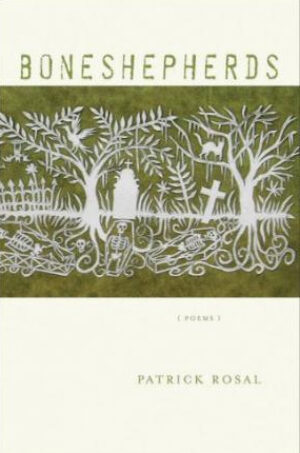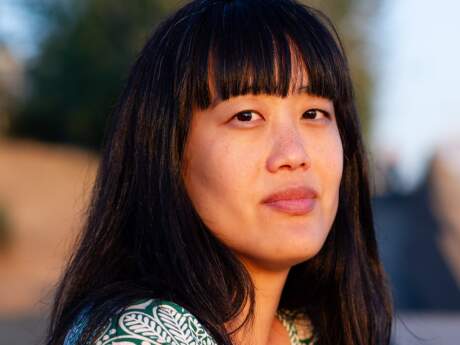In Their Own Words
Patrick Rosal's “Ars Poetica: After a Dog”

Ars Poetica: After a Dog
Here is a sex shop and a Bible shop
two doors down. Between them a sick hound roams.
Let's suppose this. There is also a two-
family house (where three families live)
across the street from a deli and this
check-cashing shack with a rabbit hutch out
back. Any one of these has been burned down
twice.
Let's suppose this is America.
Over the years we have become the kind
of tribe that has forgotten how it trades,
over chess and chit-chat, a mango or
Jesus honey for knives. Now, we thank God
the Almighty we don't know what it's like
to be close to one another. Georgy
the Idiot, for example, feeds this
sick dog flowers. And we watch him. But then
suppose two (or twenty) of us—more—
hear a sound, some familiar din, far-off
tambourines, children's laughter, though a bit
dark, like bell and bone, and it simply grows
until we are looking at each other
wide-eyed with this small thrill calling us out,
this handsome buzz-saw racket, this rhythm
that bores the air a gurdy hum. What if,
our numbers suddenly flood a small stretch
of spoiled turnpike or dried out meadow, what
kind of sound is this that rallies us all
from precinct to nook, what noise to muster
tremors from King James and Hustler alike,
what uproar, what raucous fuss in every
American vicinity, and I
know you don't believe any human noise
can call us all together per se, but,
listen, suppose we are moved, summoned, you,
me, and the rest of us who want to know
something about everything we've outlived.
By hullaballoo, we gather, beckoned,
not too far from the XXX store and
the Bible store, not too far at all for
Georgy to carry in his sleeves the scent
of mongrel or bad cheese or onion skin
and cheap ink, and you and I and Georgy
and all stand, elbow to elbow, this small
throng of the ordinary, armed for once
with our full wits, and no, let us not say
it is a singing, but say this, this sound,
as we approach, gets stranger and stranger,
so much so, we mistake it for ourselves.
It has the bony rattle of dice-quick
wrists, the abundance of olives and lake-
shore sand. It resembles the scripture and
curse you and I, in dim-lit squares and dance-
floor muck, in crawfish mud and dancehall wine,
in broken-bed and graveyard bliss have been
grinding for all our lives, this joyful wind
and rewind of the body back down and
into jubilance so old no vector
of bullet or blade could fleck the soggy
pale neck of a boy offered to God, no
battalions of angels to save him, say,
what if this sound that is not a singing
becomes, one by one, the lot of us, us
improbable, us gorgeously common,
us tune's contagion. What if us do sing
with sand caught in our teeth, mango dripping
from our mouths. Jesus-honey wild, what if
the very knives start clanging too. What if
those first no-song strains open the sex-shop
neon in us, musk in us, whiskey stink
so deep down in us we sing like this: so
funky, so loud, we refuse to neglect
what ramshackle bunkhouse, penthouse, whorehouse
we were drawn from in the first place or how
the hell we will ever find our way back.
Even so, let's not forget, the long yawp
of the poor dog who ate fresh petals some
moron savant force-fed it, having spent
three full spring days stitching them together
with metal barbs,
what if no one recalls
that sound,
except
the few surviving dogs,
the twisted thin-wire fence and the silent
magnolia blast every May. I say,
let us not slip back through the dark to sting
and peck our beloveds with more than our
usual misdeeds. I say, let us not
forget a sick hound's metallic hack and
skirl, for Georgy has found a few more dogs
to feed his barbed garlands to and before
we count ourselves among the blessed, let's say,
we ain't done yet howling into gray tombs,
ain't yet done cracking necks. Let's say this, once
and for all, for kicks, we won't taste sulfur
at the end of a fuse.
When one is born,
when one dies, when one steals a moldy loaf
of bread—
this is how it is. The dildos
go on sale, in the rabbit hutch a snake,
we've played checkers with all the pawns, but if
there have been any lies, we're sure to let
everyone know now what they are and who
started them.
Some of us will not get fed
but let's listen, spooning in the dark, for
laughter,
for if we're lucky, sometimes both
the darkness and the laughter are our own.
This is America. If we've no choice
but sing
in multitude no better than
the soul of a wrongly punished dog, may
God, for once, not grant us many more things
as foolish as that, given the way we
ruin our guts on rusted steel and bloom.
All rights reserved. Reprinted with the permission of the author.
On "Ars Poetica: After a Dog"
"Ars Poetica: After a Dog" is a parable about sound. I imagine there are many readers who miss the primary prosodic constraint of this poem—the strict decasyllabic line. Let me come back to this.
As a teen and young adult (and beyond), I rarely had enough money to keep a bank account, so I would take my paycheck (yeah, there were like real paper checks back then) to this cramped shack on the edge of a highway that ran through our town. The place had a gravel driveway, bad siding with stripped paint, bars on the windows, and it smelled like decade-old soggy cigars. I'd go in and sign my name in green and an old-timer would take my ID and snap my picture like a passport photo or mugshot. They took a five percent cut.
It wasn't uncommon, just before I pushed the creaky screen door on my way out, for me to hear both "God bless" and "Fuck a Mother Mary" over my shoulder in that little check cashing joint. And I didn't have to travel too far southbound on the same side of the two-lane highway to pass the strip malls, the creepy Playtime Boutique and a Christian bookshop. How could a single poetic voice, even over the course of a lifetime, do justice to all of this hilarious, exuberant Jersey, let alone our wacky, tatterdemalion America? Could even one hundred or one thousand poets do that?
This poem began when I read a post online by another poet around my age who was wondering out loud who "The Chosen One" of our generation would be. It sounded like this poet was wishing for their own anointment as The One—perhaps. Either way, the post assumed that there was no alternative to poetry than a world of one or just a few consecrated voices. I didn't get it. I mean, I knew that Literature would like to select, appoint, and canonize, but I wasn't interested.
So I started writing to this poet directly and then the language of the address turned very quickly into a question—and then a series of questions. What would it look like if we didn't have just one voice or even just a few special voices?
What if multitudes gathered and made their noise? What if each member of that multitude brought every bloody, romping, joyful part of their history? What would that sound like? "After a Dog" is a kind of allegory of how messy and complicated and not-precious a democracy is. For me, one of the pleasures of this poem is summoning all kinds of images out of my life and out of the lives of people I love that often have not made it into contemporary poetry. I like to think of all the people, places and things catalogued in this poem barging recklessly into the genteel living rooms and sober classrooms of America.
As I mentioned earlier, this poem, except for one line, is strictly decasyllabic. Every line—ten syllables. Few people notice this unless I point it out. Most academic poets, critics, workshop trained-poets who know my work think of me as a performance guy or a hip-hop poet or a slam poet (ha! I've slammed three times maybe?). A review of my early work said that my poetry was positioned, not in Asian-American traditions, but squarely "in the tradition of African-American poetry"—as if there were only one, first of all. The review also said the craft of the poems might not last. Interesting. While I have a great appreciation for poems that return me to a kind of solace, quiet, and contemplation, I also have a deep need to holler and stomp my goddamned feet. Or can a poet of Asian descent sing only in soft tones?
What happens when an Asian-American poet does not merely kneel to the traditional European order of prosody but re-masters it with church sermons and hymns, cutting sessions and blessings, shit-talking-on-the-stoop and stuttering farewells? Given my rage and love, how could I not already test the upper and outer limits of my voice? My body happens to know some things.
Fuck the domesticated, flute clinking, tame image of the Asian-American artist. I like to think of "After a Dog" as a traditional European-American architecture flooded with the improvisational elegiac howls of my ancestors' dung-aw. If you have never had to imagine a mother or father weep over the body of their dead child, then you might not yet have the poetic ear to hear the full dynamic range of this poem or many other poems of mourning and celebration.
Feeling is the freight of sound. A 21st century poem is composed from the body and toward other bodies—past, present, and future; as such, a poem constantly renews both feeling and music. A good poem is constructed of some inner trouble or inhibited love let loose. Sometimes its music is an uproar. Sometimes it just sounds like us talking. Don't sleep on a few billion you've dismissed as hacks or savages. Sometimes the music sounds like when all the awful folks get out and sing.



